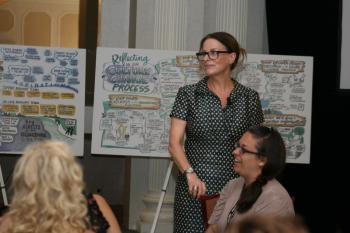“People want love, they really do,” said Daniella Greenwood midway through her opening keynote address on Sept. 26 at the 2017 Schlegel Villages operational planning retreat.

Daniella Greenwood speaks to the power of relationships in
the changing culture of aging.
In the realm of culture change in aging, perhaps this is the central idea to consider: the move into a long-term care or assistive living environment doesn’t alter the human hunger for connection. People don’t relinquish their need for the love an authentic relationship can offer as they age. In fact, the depth of the relationships they experience in their new home makes all the difference in continuing to live a life of meaning. The organization that inherently understands this will lead the way to a better approach to care, and the 2017 operational planning retreat is meant to refocus each village on the value of true relationships.
As the national strategy and innovation manager with Arcare Aged Care in Australia, Daniella has been deeply connected to the organization’s quest to change the culture of care and support it offers. A central lesson Daniella has come to Niagara Falls to impart is that the importance of reciprocal relationships in quality care can never be understated.
Culture change, as a concept, is at risk of becoming nothing more than a catch phrase, a term organizations can toss around to assure prospective residents and families that they’re different. However, to live the change and to truly offer meaning to residents is far from an easy concept. The custodial approach to care and the professional distance that defines acute care in a hospital setting, Daniella told the audience, has no place in a social model of care. Yet long-term care and seniors living “is a big system that’s entrenched with a lot of old ways of doing things. Doing this in the real world is tricky . . . and people underestimate the complexity of the work we do.”
But if team members are given the freedom and permission to develop genuine relationships and offer the best of themselves to those they serve, then positive change can flow organically.
“If I had to sum up culture change, it’s pretty simple,” Daniella said. “It’s about all of us answering this question: How do we need to treat one another? How we treat one another speaks to our relationships with each other.”
Throughout Day 1, team members considered the fundamental roots of their connection to the work they do by answering another basic question: “What is it about working with older people that brings you the most joy?”
The answers throughout a room of 250 people centred on a few major themes: laughter, knowledge exchange, the sharing of stories and personal histories.
“It’s about moving beyond that professional distance, especially in our relationships, and bringing that humanness to work with us,” Daniella suggested.
Success can be judged by the depth of the relationships that bloom, and over the course of three days in the waning of September, each of 19 village teams will develop their operational plans with the fostering of authentic relationships at the core of every step.
- Previous
- View All News
- Next
















































































































































































































































































































































































































































































































































